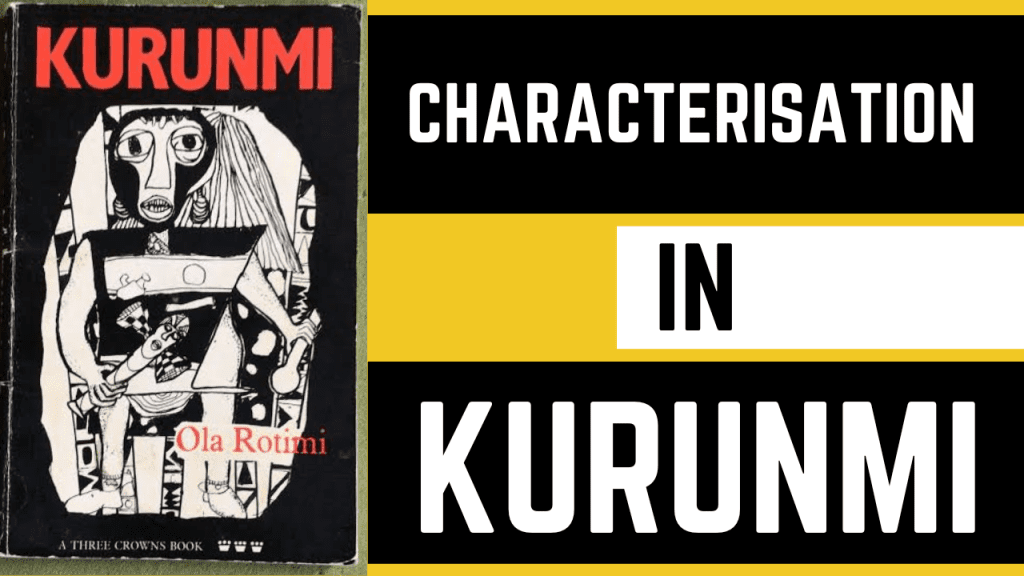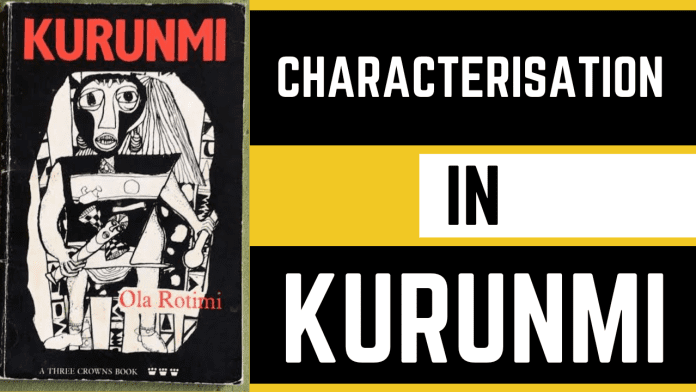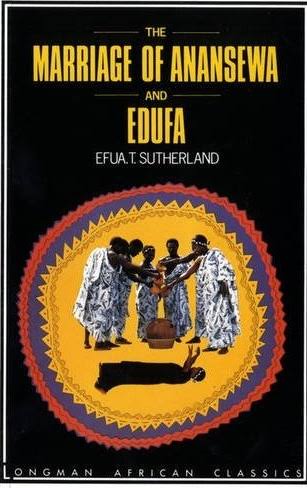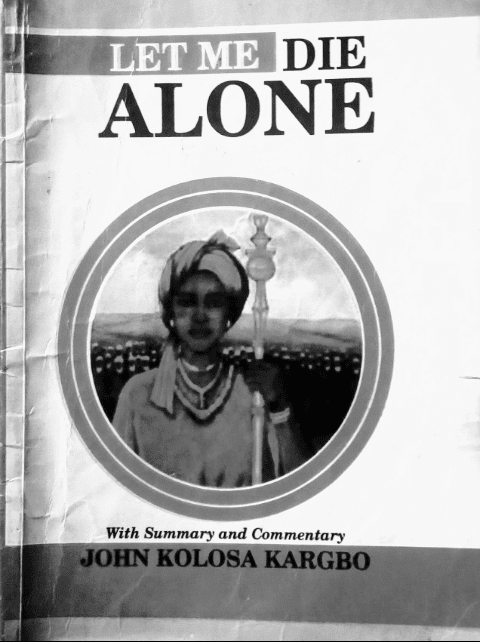The play, Kurunmi: An Historical Tragedy (1971), by Ola Rotimi draws on historical facts to tell the story of the Ibadan-Ijaye war, the events leading to the catastrophic war, and the ideological differences that fuelled the war among a Yoruba people that were supposed to be their brothers’ keepers. Many of the characters in this play were principal actors in the said war.
At the centre of the actions is Kurunmi, the eponymous character and tragic hero. Other characters in Kurunmi include Balogun Ogunmola, Bashorun Oluyole, Balogun Ibikunle, Reverend Mann and wife, Mosadiwin, Bashorun Somoye, Timi Ede, Balogun Ogunkoroju, and Areagoro.
In this post, we shall briefly discuss some of the characters with particular focus on Kurunmi for whom the play is titled. Of course, the list of the characters is inexhaustible but we shall discuss the ones that appear important in the development of the plot. Let us start with Kurunmi.
Kurunmi
Kurunmi is the tragic hero in Ola Rotimi’s play. Aare Kurunmi of Ijaye is the tenth Aare Ona Kakanfo (the generalissimo of Yoruba armed forces) of Yorubaland. In the play, Kurunmi is portrayed as a staunch traditionalist in that he believes in the perpetuation of well tested practices and frowns at any sudden departure from these tested paths. This ideological position of course informs his refusal to be swayed by the decision of Alaafin Atiba to scrape the tradition that requires that the first son of the Alaafin be buried with the Alaafin.
When Alaafin Atiba dies, Adelu, his first son, is installed as the new Alaafin instead of dying too and being buried with the Alaafin, Kurunmi refuses to recognise the legitimacy of the new Alaafin. His decision like a magnet would attract a devastating war on Ijaye, marking the beginning of his downfall.
It is important to understand that Kurunmi is a principled man and that he does not meet his tragic downfall because he exerts too much power for an individual. Rather, he meets his tragic downfall largely because of the values he espouses and his insistence on the preservation of the tradition.
Kurunmi is loquacious and does not mince words even when he addresses his contemporaries and equals. This much we see in his berating of Timi Ede and Bashorun Oluyole for succumbing to Alaafin Atiba’s wish for the circumventing of an established practice.
Kurunmi is a magnanimous personage. The extent of his magnanimity is seen in his assembling of Ijaiye people for a feast. It is also seen in how he regards Ijaiye people as his children.

Kurunmi is portrayed as an embodiment of good leadership. When he is challenged by his subordinates who feel threatened by his growing power and his running of Ijaiye without the necessary accountability and separation of powers, Kurunmi quickly makes amends and resolves to carry them along in his decisions. He recognises that without them on his side, he is powerless. This again is demonstrated in his decision to commit suicide. According to him, a leader who has led his people to their deaths has no reason to live for. This consciousness distinguishes Kurunmi as a model leader.
However, Kurunmi, like another Ola Rotimi’s tragic character, is hot-tempered. He flares up when he is not taken seriously by others. He also exerts too much power. He controls the religion, administration of Ijaiye, leads the entirety of Yoruba armed forces, etc. These duties confer on Kurunmi an absolute power.
Kurunmi is eventually caught in the clog of change which sweeps him under the rug of history. He loses his five sons all in a day in the scorching war.
And as characteristic of Are Ona Kakanfo defeated in warfare, Kurunmi commits suicide in embrace of the humiliation defeat meant for him and his people. He leaves the final instruction that his body be buried in a river.
When a leader of men has led his people to disaster and what remains of his present life is but a shadow of his proud past, then it is time for the leader to be no more.
Kurunmi (p. 93, Kurunmi)
Timi Ede
Timi Ede is the traditional monarch of Ede and occupies an important place in Alaafin’s Oyo. He and Bashorun Oluyole come to Kurunmi to reconsider his position. The duo is humiliated by Kurunmi for being easily swayed by the dictates of Alaafin Atiba.
Timi however opines that “the ways of men must change with time.” Bashorun Oluyole expresses similar sentiment, saying “tradition must change with man.”
Read: Memorable Quotes from Ola Rotimi’s “Kurunmi”
Bashorun Oluyole
Bashorun Oluyole is the prime minister of the Oyo Empire and the leader of the Oyo Mesi, a body of noblemen who performed judicial and administrative functions; and keep the powers of the Alaafin in check in the interests of the Oyo Empire. As the Bashorun, Oluyole occupies a very important position in the administration and the decision-making process in Oyo.

Together with Timi Ede, Bashorun Oluyole goes to Kurunmi to convince him about his position on the tradition. They are both insulted and denigrated by Kurunmi instead for being complicit in the perversion of the existing tradition of throne succession. Bashorun Oluyole is of the opinion that “tradition must change with man” (p. 20), a position that pits he and the other members of the Oyo Mesi against Kurunmi who holds dear to the dictates of tradition.
Balogun Ogunmola
Ogunmola is an Ibadan war leader. He is hot-tempered, ruthless, restless, and he flares up at any hint of weakness from other characters.
For him, the war on Ijaiye is personal; it is more than a war to establish the supremacy of the Alafin. It is his chance to redeem himself of the ignominious treatment he had suffered in the hands of Kurunmi. It is a chance for his personal vendetta and he makes judicious use of it.
His hatred for Kurunmi predates the Ibadan-Ijaiye war. He and Kurunmi had once been involved in a brawl. When the latter captured him, he tied him to a post like a goat and fed him with ashes. This haunting humiliation is what Ogunmola tries to assuage with his personal agenda in the war. He gets angry at anyone who tries to keep the war in check. He is particularly angry at some Ibadan war chiefs who advise against war, calling them cowards, and at Balogun Ibikunle at some point in the war when the latter calls for patience and the need for strategic planning over rash actions.
Eventually, Balogun Ogunmola gets his revenge after he is instrumental in the deaths of Kurunmi’s five sons and the ransack of Ijaiye.
Ogunmola is portrayed as a restless, hot-tempered, self-driven man who will stop at nothing to get his revenge. He sees anyone that has differing views especially on the war issue as weaklings. He has a lot of ego to match his fury.
Read: Ola Rotimi’s “Kurunmi”: Things You Need to Know
Balogun Ibikunle
Balogun Ibikunle is an Ibadan war general. He calls the shots for his side in the war between Ibadan and Ijaiye. Unlike Ogunmola, Ibikunle is a calm, patient, strategic, and intelligent military leader. With these qualities, he not only serves as a foil of Ogunmola, but also keeps his excesses in check. When the war turns against them, he effortlessly keeps his henchmen from despair and from developing cold feet. According to him,
A good soldier has discipline. He does not fight only when fighting is good for him, and run away when omens of war turn bad.
Ibikunle (p. 70, Kurunmi)
Balogun Somoye
Balogun Somoye is an Egba war leader who rallies the Egba army in support of Kurunmi against their former master (Oyo). He reneges on this alliance and backs out of the war when a message is relayed to him that Egba is being attacked by the Dahomey soldiers.
The departure of the Egba army leaves Kurunmi and his army quite vulnerable and less powerful in the face of the Ibadan army and their allies.
Balogun Somoye sums up the situation that necessitates the decision of the Egba army in these proverbial words:
When the owl leaves its nest at noon, danger is near.
Somoye (p. 92, Kurunmi)
Balogun Ogunkoroju
Balogun Ogunkoroju is an elderly war general who “ambles self-assuredly.” He is one of Kurunmi’s henchmen in the bloody war.
Areagoro
Areagoro, like Abogunrin (Kurunmi’s praise chanter), praises Kurunmi for his leadership qualities. He is one of Kurunmi’s trusted subordinates in the play.
Mosadiwin
Mosadiwin is Kurunmi’s favourite wife. She is the famed “Mosadiwin” of Kurunmi’s trademark praise chant.
In the play, we see her take instructions from Kurunmi. She brings okro soup on Kurunmi’s request with which the latter smears the white fabric brought to him by the messengers of Alaafin. Kurunmi does this in dismay of the thwarted succession and that the new Alaafin has left an impression of an imposter and breaker of tradition.
Till the end of the play, Mosadiwin stands by Kurunmi. She takes instructions from Kurunmi on what should be done with his body when he is dead.
Arawole, Efunlabi, Ogunlade, Patoki, and Sangodele
Arawole, Efunlabi, Ogunlade, Patoki, and Sangodele are the five sons of Kurunmi. They all perish in the Ibadan-Ijaye war.
Reverend Mann
Reverend Mann is a Christian missionary and the enigma of the encroaching colonialism in the play. He preaches to Kurunmi about the need to allow peace reign. He also complains to Kurunmi about the poor reception of the Ijaiye people to the Gospel of Christ. But Kurunmi questions him on why his own people should discard the ways of their forefathers because a stranger asks them to do so in order to embrace his.
Reverend Mann and his wife document the war as it progresses, providing the audience with information on who holds the cards at each point. They also provide injured Ijaiye warriors with medical reliefs.
 WHATSAPP: Click HERE to join the new Literature PADI WhatsApp group to receive latest updates on your phone and for further literary discussions!
WHATSAPP: Click HERE to join the new Literature PADI WhatsApp group to receive latest updates on your phone and for further literary discussions!










